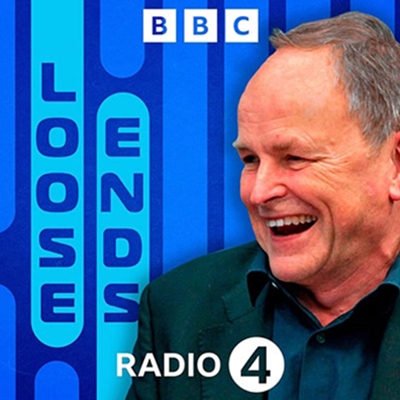
Event 1
BBC Radio 4: Loose Ends
– Global Stage
Read moreEnjoy a special live recording of Radio 4’s long-running variety show. Clive Anderson and guests offer an eclectic mix of conversation, music and comedy.
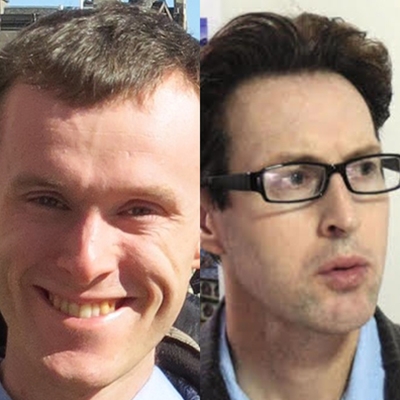
Event 2
Carwyn Graves and Alan Marshall talk to Meinir Howells
Elements of the Welsh Landscape
– Wye Stage
Read moreThe ecologist and the eco-designer discuss our landscape, how we have formed it and how we might continue to do so, in conversation with Welsh presenter and producer Meinir Howells. Graves gives a tour of the Welsh landscape, from the ffridd (mountain pasture) to the rhos (wild moorland). He dives deep into their history and ecology in his book Tir (‘Land’) offering hope for a future with richly biodiverse landscapes, still full of humans working the land. Environmental philosopher Marshall is noted for his investigations into eco-friendly cities of the future. In Sheeplands he examines the way sheep have contributed to the making of the modern world.
Sponsored by Black Mountains College

Event 3
Grace Blakeley and Liam Byrne talk to Oliver Bullough
Capitalism and Wealth Inequality
– Discovery Stage
Read moreIs there any coming back from the ways in which capitalism and wealth inequality have shaped the world? Yes, argue economic thinker Grace Blakeley and former Treasury Minister Liam Byrne, but only if we rebuild instead of trying to fix broken systems. They discuss their ideas for radical and meaningful change with writer Oliver Bullough.
Blakeley is author of Vulture Capitalism, in which she takes on the world’s most powerful corporations by showing how the causes of our modern crises are the result of the economic system we have built, which melds public and private power. Byrne’s The Inequality of Wealth puts forward five practical new ways to rebuild the old ideal of the wealth-owning democracy, drawing on conversations and debates with former prime ministers, presidents and policymakers around the world together with experts at the OECD, World Bank, and IMF.Sponsored by Squeezing

Event 4
Anna Jones talks to Meinir Howells
Easy Wins
– Wye Stage
Read moreWant to reduce waste, use less energy when cooking but still achieve kitchen triumphs? The chef and bestselling food writer (A Modern Way to Eat, One: Pot, Pan, Planet) takes 12 hero ingredients that are guaranteed to make your food taste great, and gives 125 all-new dishes that you’ll want to cook on repeat. Think Double Lemon Pilaf with Buttery Almonds, Traybake Lemon Dhal, Miso Rarebit and Cherry and Chocolate Peanut Butter Sundae. Jones shares tips distilled from her 20 years of experience, with practical advice on layering, texture and seasoning, plus plenty of ideas for vegetarian swaps. She talks to Welsh presenter and producer Meinir Howells.
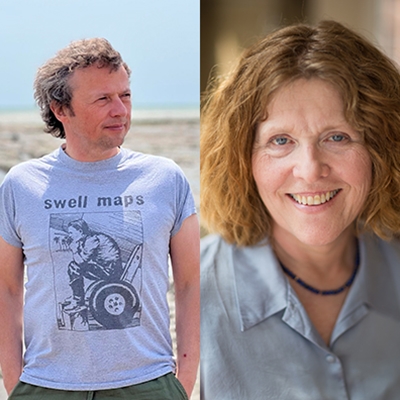
Event 5
Gareth E Rees and Fiona Stafford
Submerged Landscapes
– Meadow Stage
Read moreJoin author Gareth E Rees and academic Fiona Stafford on a journey through hidden spaces, forgotten gardens and natural and man-made phenomena that tell us about our past, present and future. Rees is author of Sunken Lands: A Journey through Flooded Kingdoms and Lost Worlds, which uncovers what our submerged past and shifting boundaries between land and water can tell us about our imminent future as rising sea levels transform our planet once more. In Time and Tide: The Long, Long Life of Landscape, Stafford combines local, literary and her own family history to look at the natural and human forces that transform places, and where we can find clues to the past.
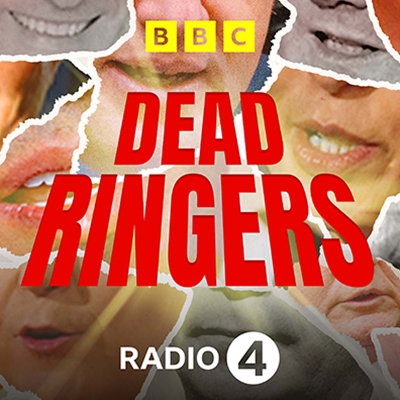
Event 6
BBC Radio 4: Dead Ringers
– Global Stage
Read moreEnjoy a special live recording of Radio 4’s flagship satire show featuring topical sketches and characters drawn from the worlds of celebrity and politics.
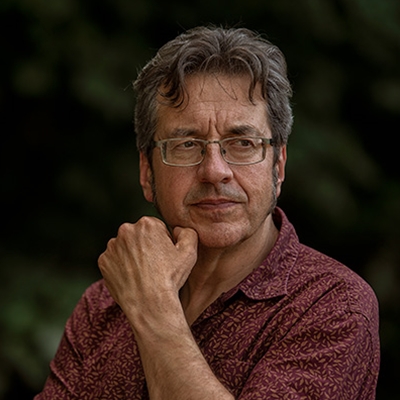
Event 7
George Monbiot
The Invisible Doctrine
– Discovery Stage
Read moreHow can you fight something if you don’t know it exists? We live under an ideology that preys on every aspect of our lives: education, employment, healthcare and leisure; our relationships and mental wellbeing; even the planet we inhabit. So pervasive has it become that it seems unavoidable. But trace it back to its roots, and we discover that neoliberalism was conceived, propagated and concealed by the powerful few. It’s time to bring it into the light – and to find an alternative worth fighting for.
Environmental campaigner George Monbiot's previous book was Regenesis: Feeding the World without Devouring the Planet. His latest is The Invisible Doctrine: The Secret History of Neoliberalism (& How it Came to Control Your Life).
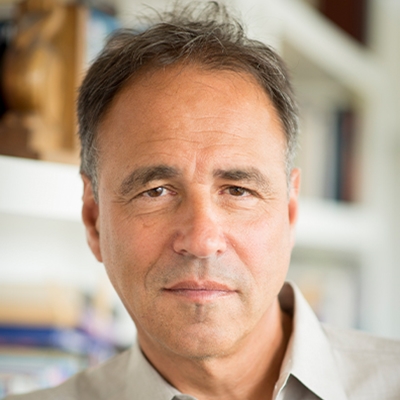
Event 8
Anthony Horowitz talks to Julia Wheeler
Close to Death
– Wye Stage
Read moreHow do you solve a murder, when everyone has the same motive? Magnifying glasses at the ready in this event with the bestselling author of the Detective Hawthorne novels. In the latest, Hawthorne is faced with a seemingly impossible puzzle – a man is shot dead within a quiet, gated community, and it appears that every neighbour has a reason to hate him. Horowitz talks about his characters and his work, which includes two highly acclaimed Sherlock Holmes novels, three James Bond novels, and mystery novel Magpie Murders, recently adapted for the BBC with Lesley Manville.

Event 9
Thomas Heatherwick talks to Suhair Khan
Humanise
– Meadow Stage
Read moreThomas Heatherwick – one of the UK’s most prolific designers – talks about his work, characterised by originality, inventiveness and humanity. He founded his studio in 1994 to bring together architecture, urban planning, product design and interiors into a single creative workspace, now comprising 200 makers and inventors. The team is currently working on more than 30 projects in ten countries, including Google's HQ in London. Recently completed are Bay View and Gradient Canopy, Google’s first purpose-built campuses in California, the Zeitz Museum of Contemporary Art Africa in Cape Town and Coal Drops Yard in London’s King’s Cross. Heatherwick talks to technology entrepreneur and creative leader Suhair Khan.
Sponsored by Danielle Flowers Woodturner
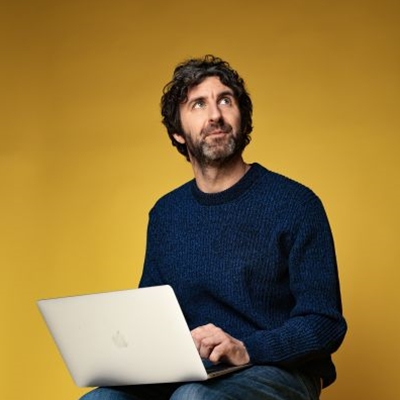
Event 10
Nish Kumar
Stand-up: Nish, Don’t Kill My Vibe
– Discovery Stage
Read moreNish Kumar has achieved huge success on the stand-up circuit with five rave reviewed shows at the Edinburgh Fringe Festival, two of which have been nominated for the prestigious Comedy Award for Best Show. He’s starred in two series of his own show for BBC Radio 4, Spotlight Tonight, and has hosted The News Quiz and his own spoof news series, The Mash Report, for BBC Two. He’s appeared on QI, Mock the Week, Live at the Apollo, Have I Got News for You and 8 Out of 10 Cats Does Countdown. Nish, Don’t Kill My Vibe is his latest show-in-progress, coming fresh to Hay Festival!
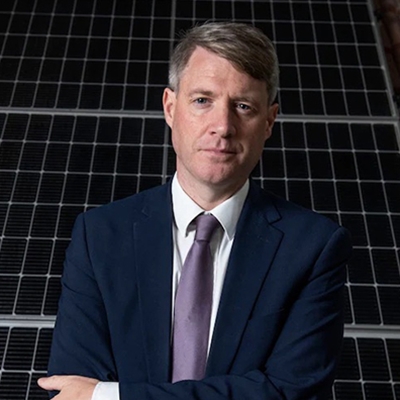
Event 11
Chris Skidmore
Net-Zero: A Future Worth Resigning Over
– Wye Stage
Read moreFew are better placed to discuss how the UK can meet its climate and biodiversity obligations than Chris Skidmore, the former Energy Minister who resigned as an MP in protest at the government’s plans to expand oil and gas production in the North Sea. Skidmore, who was responsible for signing Net Zero into law and chairing Mission Zero, the largest independent engagement exercise on Net Zero conducted to date, outlines the key ways in which the UK can deliver its commitments as part of the global Net Zero strategy, highlighting not just the challenges but also the opportunities for new jobs and investment in a better way of living.
Sponsored by Ty-Mawr Lime

Event 12
Morning Yoga with Hay Yoga Collective
– Creative Hub
Read moreStart your day with an hour of yoga blending movement, mantra, meditation and breathwork. The classes support detoxification and regeneration – physically, emotionally and spiritually. Our daily yoga classes are brought to you by a collective of ten highly skilled practitioners, all local to Hay-on-Wye. Each practitioner has their own style, but with all you can expect a mindful, student-focused practice with clear cueing and functional sequencing.
Whether you need grounding and recharging before a busy day at the Festival, an opportunity to stretch and move your body, or simply an hour to focus on your breathing, these classes are open and accessible to all. Practitioners will adapt to different levels of experience, providing options for deepening or softening within poses so that each student takes what they need from the practice. Beginners and experienced students are most welcome. Yoga mats are provided.
Please contact Clare Fry at hello@larchwoodstudio.com with any questions relating to these classes. As capacity is limited, we recommend booking in advance to avoid disappointment.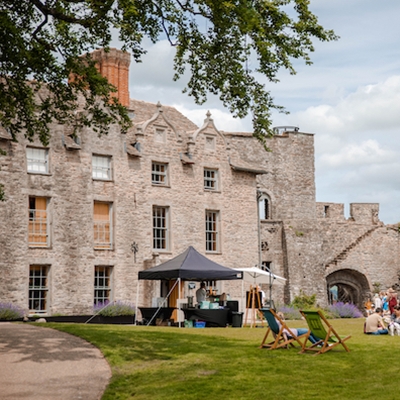
Event HC1
Hay Castle Entry Ticket
– Hay Castle
Read moreA fantastic opportunity to see behind the scenes of this unique and historic building. Visit at a time of your choice during Castle opening hours.
A Hay Castle Trust event

Event 13
Wayfaring Walk with National Park Guides
Wayne Lewis and Rhys Guevara
– Meeting Place on Festival Site
Read moreGuides from the Bannau Brycheiniog National Park lead a walk through the beautiful surrounds of Hay-on-Wye.
Hay-on-Wye is based within 520 square miles of beautiful landscape that makes up the Bannau Brycheiniog National Park. The National Park is driving change to bring about a sustainable future, meeting our needs within planetary boundaries. Their Hay Festival series of walks take you into the town’s local environment while offering the opportunity to learn more about the Park’s work and its treasured landscape.
In partnership with Bannau Brycheiniog National Park

Event S21
BBC Radio 4: Front Row
Young Adult Fiction
– Exchange Marquee
Read moreYmunwch â thîm y BBC wrth i Front Row ar BBC Radio 4 ddathlu Ffuglen i Oedolion Ifanc, ac archwilio'r ystod ryfeddol o straeon a materion sy'n cael sylw mewn nofelau plant heddiw. Yn ymuno â Tom Sutcliffe mae awduron poblogaidd, gan gynnwys Manon Steffan Ros, enillydd Medal Yoto Carnegie 2023, a'r awdur arobryn Alex Wheatle. Bydd y digwyddiad hwn yn cael ei recordio i'w ddarlledu ar BBC Radio 4.
Join the BBC team as BBC Radio 4’s Front Row celebrates Young Adult Fiction, exploring the extraordinary range of stories and issues tackled in children’s novels today. Tom Sutcliffe is joined by bestselling authors, including Manon Steffan Ros, winner of the 2023 Yoto Carnegie Medal, and award-winning author Alex Wheatle.
This event will be recorded for broadcast on BBC Radio 4 - Please arrive in good time.
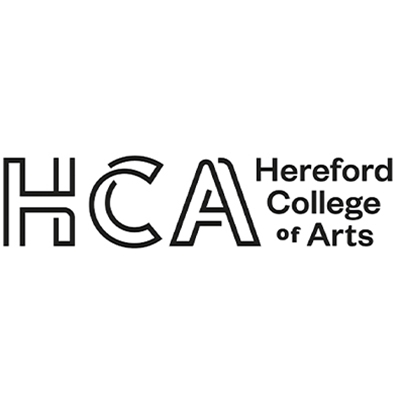
Event F1
Hereford College of Arts Vocal Ensemble
Popular and Traditional Songs
– Bookshop Garden
Read moreCome and enjoy some music in the Bookshop Garden. The Hereford College of Arts Vocal Ensemble perform their dynamic repertoire of four-part harmony arrangements from popular and traditional songs.
Hereford College of Arts is a dedicated arts college with a specialist focus on art, media, design, popular music and performing arts.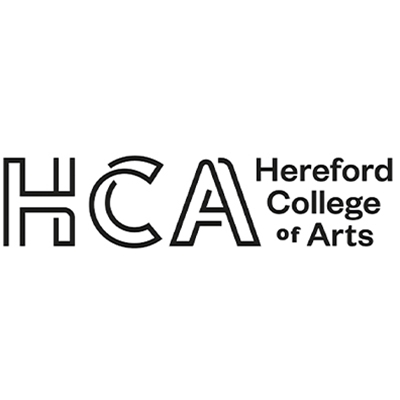
Event F2
Hereford College of Arts Theatre Students
These Violent Delights
– Bookshop Garden
Read moreSparks fly in this fast-paced and fiery production in the open air. Hereford College of Arts theatre students present These Violent Delights, a visceral exploration of the relationships found in Shakespeare, from Hermia and Helena to Beatrice and Benedick.
Hereford College of Arts is a dedicated arts college with a specialist focus on art, media, design, popular music and performing arts.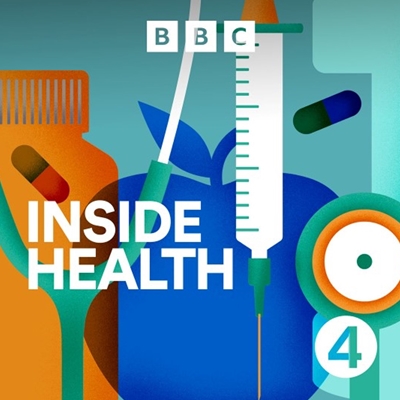
Event 420
BBC Radio 4: Inside Health
– Exchange Marquee
Read moreJames Gallagher, host of BBC Radio 4's Inside Health, delves into the science of ageing and how to age well.
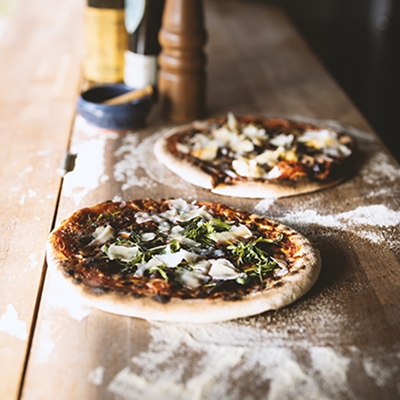
Event W1
Pizza-making Workshop
Kitchen Garden Pizza
– Family Garden
Read moreCome to the Family Garden for a pizza masterclass with Kitchen Garden Pizza. In this one-hour session your imagination and creativity will be fed along with your belly! You’ll get your hands messy with freshly grown and foraged ingredients, make and top your own dough and observe the pizzaioli at work at the wood-fired oven. And while you wait for your pizza to cook, you can decorate your own pizza box!
Dairy-free and gluten-free options available
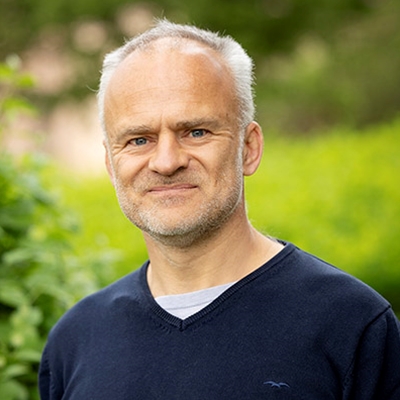
Event 14
Brett Christophers talks to Grace Blakeley
Why Capitalism Won’t Save the Planet
– Wye Stage
Read moreHow do we save the planet? Political economist and economic geographer Brett Christophers argues that first we need to look at our understanding of capitalism and climate, and accept that saving the planet is not profitable enough for markets and the private sector. Today’s consensus that curbing climate change can be done through green electricity and measures such as ever-cheaper solar and wind power aren’t the key, says Christophers, because investment is driven not by price but by profit. He talks to economics and politics commentator Grace Blakeley about his illuminating book The Price is Wrong: Why Capitalism Won’t Save the Planet, challenging our long-held views about how to combat climate change.
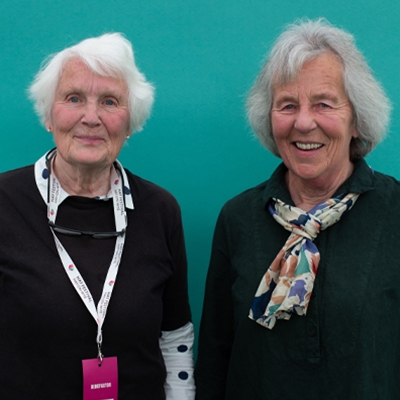
Event 15
Elizabeth Bingham and Mary Morgan
Remarkable Memorials near Hay-on-Wye
– Meadow Stage
Read moreHay resident Mary Morgan and local historian Elizabeth Bingham return to the Festival following previous years’ popular talks on local churches and castles. Now they’ve turned their attention to local monuments and memorials – their subjects include the Chartists’ cave, artists and actors, the Brute stonemasons, a Methodist martyr, a notorious ghost, aircraft crashes, Victorian vicars, a murdered pedlar, a Neolithic monument, a bulldog, water troughs and a wood.
Sponsored by Hay-on-Wye Tourist Information Bureau
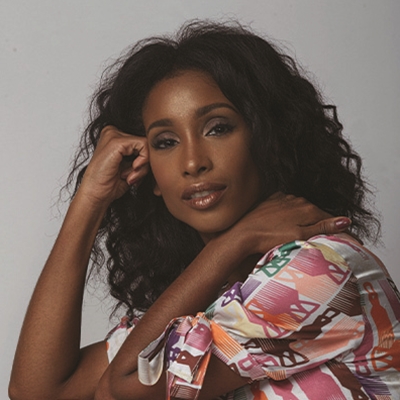
Event 16
Vanessa Walters talks to Alex Wheatle
Debut Discoveries: The Lagos Wife
– Spring Stage
Read moreVanessa Walters discusses her British debut, a thriller about family, motherhood, identity and diaspora, with Alex Wheatle, author of Cane Warriors. Author of two books for young adults, this is Walters’ first adult fiction, described by writer Afua Hirsch as “a brilliantly original novel.”
Nicole Oruwari disappears during a boat trip. Born in south London, she had moved to Lagos to begin a new life with her perfect husband, but something went wrong. Back in London, her busybody aunt Claudine decides to fly to Lagos to investigate the mystery...
Supported by Hawthornden Foundation
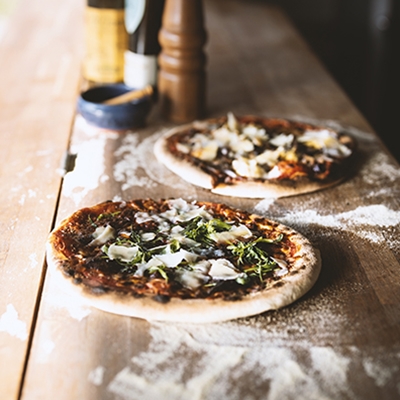
Event W2
Pizza-making Workshop
Kitchen Garden Pizza
– Family Garden
Read moreCome to the Family Garden for a pizza masterclass with Kitchen Garden Pizza. In this one-hour session your imagination and creativity will be fed along with your belly! You’ll get your hands messy with freshly grown and foraged ingredients, make and top your own dough and observe the pizzaioli at work at the wood-fired oven. And while you wait for your pizza to cook, you can decorate your own pizza box!
Dairy-free and gluten-free options available
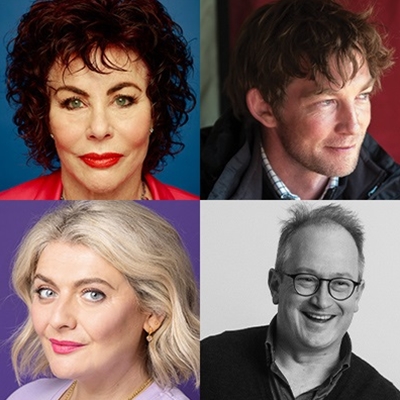
Event 17
Ruby Wax with Horatio Clare, Bryony Gordon and Robin Ince
Thinker in Residence: Mental Health
– Global Stage
Read moreRuby Wax speaks with Hay Festival guests about mental health issues. She is well known for advocating an open and honest approach, most recently in her book and touring show I’m Not as Well as I Thought I Was. Wax is one of our Hay Festival 2024 Thinkers in Residence – a group of writers and readers hosting events throughout the week questioning norms, finding new perspectives and challenging us to action.
Writer and broadcaster Horatio Clare is the author of Heavy Light: A Journey Through Madness, Mania and Healing. Journalist Bryony Gordon's latest book is Mad Woman and Robin Ince is a comedian, author and broadcaster.

Event 18
Michael Mann
Our Fragile Moment
– Discovery Stage
Read moreJoin us for an enlightening session with acclaimed climate scientist Michael Mann. Mann’s The New Climate War, which garnered high praise in the UK, showed how fossil fuel companies have waged a thirty-year campaign to deflect blame and responsibility and delay action on climate change. In his latest book Our Fragile Moment, Mann delivers a compelling narrative outlining the urgent threat of the unfolding climate crisis. His clear and impactful message emphasises the crucial need for immediate action to avert further devastation to our planet.
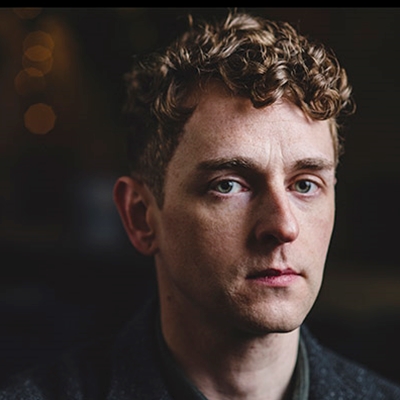
Event 19
Diarmuid Hester
Nothing Ever Just Disappears
– Meadow Stage
Read moreRadical cultural historian, writer and activist Dr Diarmuid Hester brings to life the stories of seven remarkable figures – from EM Forster to Derek Jarman – and illuminates the connections between where they lived, who they loved and the art they created. He shows that a queer sense of place is central to the history of the twentieth century and powerfully evokes how much is lost when these spaces are forgotten. Hester is a research associate of Emmanuel College, Cambridge, and a BBC New Generation Thinker. He co-founded Cambridge’s queer performance and music night Club Urania.
In association with the University of Cambridge
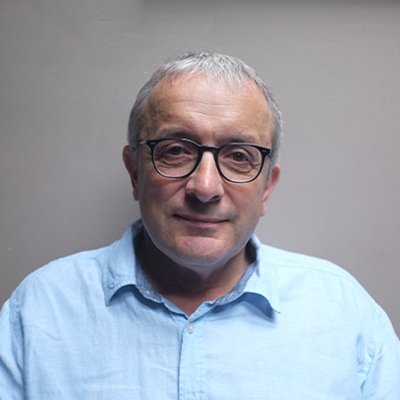
Event 400
Roland Philipps talks to Bronwen Maddox
Roger Casement
– Wye Stage
Read morePioneering human rights campaigner, patriot, traitor, romantic and LGBTQ+ martyr, Roger Casement is one of the 20th century’s most complex and compelling figures. Roland Philipps (author of A Spy Named Orphan) discusses his biography of this contradictory man, Broken Archangel: The Tempestuous Lives of Roger Casement.
Internationally celebrated for unearthing the grotesque violence of the Belgian Congo, Casement won a knighthood for his humanitarian work in the Amazon jungle. But his internal fault lines ran deep, caught between England and Ireland, Protestant and Catholic, contemporary mores and private emotions. He was tried and executed for treason – only now can we fully understand his surprisingly modern and deeply relevant life and legacy.

Event 422
BBC Radio Wales: Aberystwyth Book Club
– Exchange Marquee
Read moreJoin BBC Radio Wales for the third year in a row, as our enthusiastic readers take a trip from Aberystwyth to the Hay Festival to review a book featured on this year’s line-up.
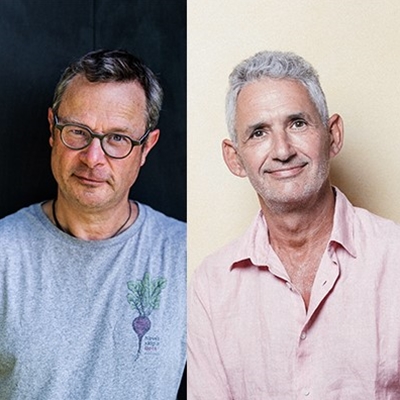
Event 20
Hugh Fearnley-Whittingstall and Tim Spector
Eat Well, Live Well
– Global Stage
Read moreThe food and nutrition experts discuss eating for health and gut happiness.
Having a healthy gut is fundamental to good health, and the best way to harness the benefits of gut health is by eating plants, says the River Cottage author. He shares the know-how in How to Eat 30 Plants a Week: 100 Recipes to Boost Your Health and Energy, to help us put more plants on our plates, whether we are omnivores, vegetarians or vegans.
In Food for Life, scientist Tim Spector investigates everything from environmental impact and food fraud to allergies, ultra-processed food and deceptive labelling. He is author of Spoon-Fed and The Diet Myth, and Professor of genetic epidemiology at King’s College London. He also leads the ZOE Health Study, which analyses our unique gut, blood fat and blood sugar responses, so that we can improve our long-term health.
Sponsored by The Granary – Café & Restaurant

Event 21
David Van Reybrouck talks to Julia Wheeler
Revolusi
– Discovery Stage
Read moreDrawing on hundreds of interviews and eye-witness accounts, David Van Reybrouck (Congo) brings the gripping story of Indonesia’s struggle for independence alive with human detail at every turn in Revolusi: Indonesia and the Birth of the Modern World. Four million civilians had died during the WW2 occupation by the Japanese. In the grim aftermath of the war, another 200,000 people would lose their lives as the Dutch used savage violence to reassert their former colonial regime against the guerrilla war of resistance: the ‘revolusi’. But the Netherlands would be forced to cede all sovereignty, ending 350 years of colonial rule and setting a precedent that would reshape the world.
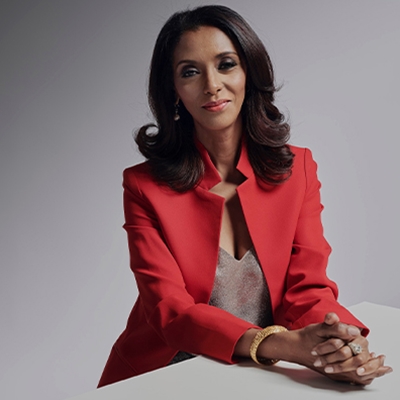
Event 22
Zeinab Badawi talks to Areeba Hamid
An African History of Africa
– Wye Stage
Read moreIn the history and story of Africa is the history and story of human civilisation, and yet little of the continent’s early and modern story is widely known. Award-winning broadcaster and SOAS president Zeinab Badawi sets the record straight in her seminal book, An African History of Africa: From the Dawn of Humanity to Independence, which takes readers from the origins of our species, through ancient civilisations and medieval empires with remarkable queens and kings, to the miseries of conquest and the elation of independence. She tells Areeba Hamid, joint executive director of Greenpeace UK and the first woman and first person of colour to lead the organisation, about travelling to 30 countries in Africa, the people she spoke to, and why it’s essential the history of Africa is told through the voices of Africans themselves.
South to South Conversations supported by Open Society Foundations
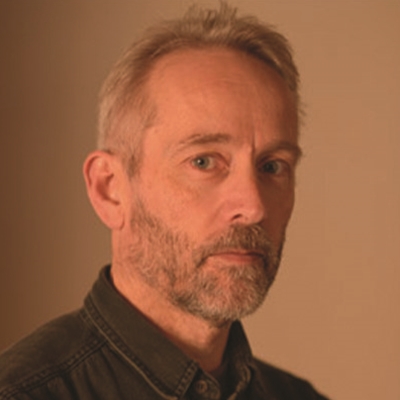
Event 23
Jasper Fforde
Red Side Story
– Meadow Stage
Read moreJasper Fforde is here to show you the UK, but not as we know it. Civilisation has been rebuilt after an unspoken ‘Something That Happened’ five hundred years ago. Society is now colour-based, the strict levels of hierarchy dictated by the colours you can see. From the economy to the health service, the shadowy National Colour reigns supreme. Negotiating the narrow boundaries of the Rules, Jane and Eddie must find out the truth of their world: what is it, where is it and is there a safe place that they can escape to?